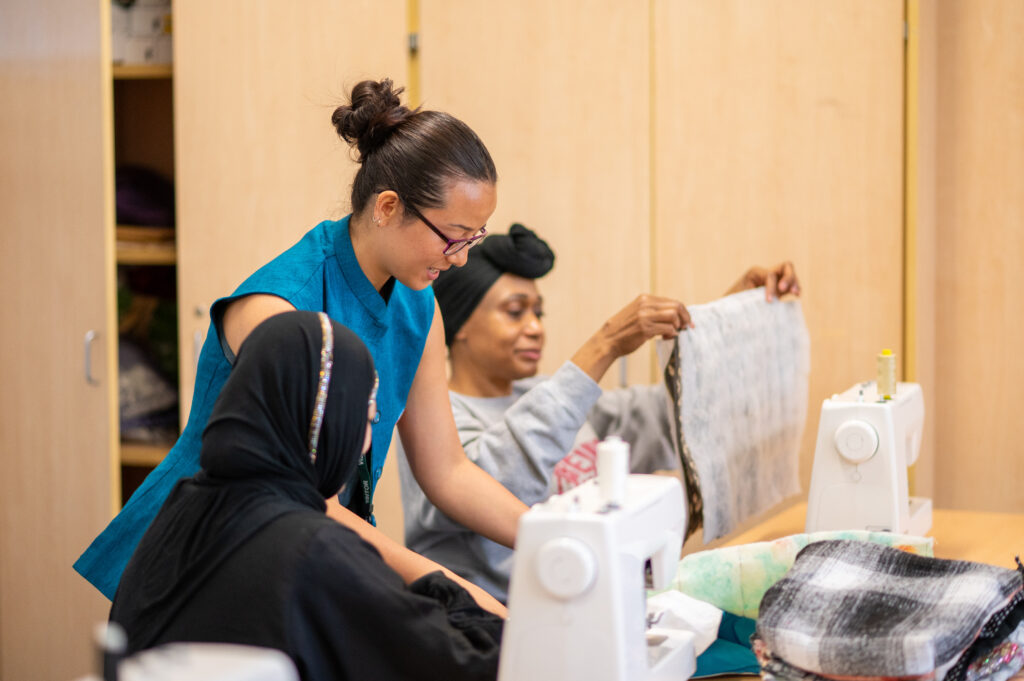
A Director’s perspective: a loan to protect our future
Second Floor Studios & Arts (SFSA) has been offering affordable creative studios in London for more than 20 years. The social enterprise rented several buildings, but knew it needed to move to ownership to secure its long-term future.
So, when the opportunity came up to buy a 250-year leasehold as part of a mixed-use scheme in Deptford, SFSA decided to take the plunge.
SFSA co-owner Nichole Herbert Wood tells us more.
How did Deptford Foundry come about?
A few years ago, our founding director, Matthew Wood, understood the pressures of commercial property in London and knew we would find it harder and harder to secure long-term, affordable leases. Many organisations from more lucrative sectors were offering more than us in rent, pricing us out of the market.
The sector has lost half of its provision due to the difficulty of keeping property in London. But the demand for affordable workspace isn’t dropping. It’s stronger than ever.
Matthew decided that he wanted SFSA to secure a site. In 2014, we started actively seeking conversations with developers. We found the Deptford site in 2015 and exchanged in 2016. Owning our asset completely changes our future viability.
In what way?
The only way to stop the trajectory of increasing costs is to own the asset. Plus, property in London is on a long-term trend of appreciating in value. An appreciating asset is very valuable as it then gives us headroom for further borrowing, which will enable us to buy more studio projects. Asset ownership gives an organisation true longevity; otherwise, your company is only worth the life of your lease.
Ultimately, our aim is to pay down the loan and then we can reduce the rents we charge if we want to.

© Second Floor Studios & Arts – Deptford Foundry
Can you explain how you set the rental cost for a studio?
Rent is set at an affordable rate based on our experience of operating in the sector for more than 20 years.
Buying a new site and making the finance work is incredibly hard, so we have a blended classification of studios on site. The lowest tier is graduate starter studios, which are £12.50 per square foot. Then you have the middle tiers – ground floor and first floor studios £15-17 per square foot. Our top tier is for commercial creatives, such as architects and graphic designers, who pay £24 per square foot. They’re basically cross-subsidising the discounted studios.
Have tenants been able to keep using the studios during the pandemic?
Yes. The studios are all self-contained places of work, so they have remained open.
Why did you choose Charity Bank for your loan?
SFSA believes in the creation of social value; we aren’t all about profit. We wanted to have a financial partner that shared our values.
How did you find the process of applying for the loan?
I’d never sought a commercial loan before, let alone for such a large amount of money. It’s a robust and lengthy process, but you have to trust in the system and understand that with such large amounts of money at stake everyone needs to feel comfortable with what’s happening.
This is the first project of its kind in London’s Zone 2 in a decade. It’d been incredibly difficult at times, but we still found a way.
What are the main challenges of the process do you think?
The costs associated with securing the loan, such as lawyers, architects, valuations and other fees. In total, professional, and ancillary services cost us 8% of the property purchase price again.
I really wish I’d understood all the linked costs beforehand; they are sizeable and hard to finance when you’re a social enterprise. There was nowhere to get that information in advance. I’m now in the process of creating open source data detailing all of our costs, so that other studio founders can be aware of what’s involved before they start the process.
What worked well?
Charity Bank and SFSA share values. That brings with it a commitment to find solutions and both parties were flexible in responding to concerns and finding resolutions.
What support does your Charity Bank relationship manager provide?
I have got to know Dave quite well. We both come from Bristol and ride motorbikes so often drift off the topic of finance! Having more than a cursory relationship means I can ask rookie questions and know that there won’t be any judgement.
Could you have bought the site without loan finance?
Categorically not. We raised some money through crowd funding and secured a grant from the Mayor of London’s Good Growth Fund to help with the fitting out, but to actually purchase the site, we had no other option than sourcing a commercial property loan.
Will the repayments be less than the rent you would be paying?
Yes. The loan repayments should be at least 50% lower than the rent.
What would you say to other studio providers looking at doing a similar project?
What we’ve done is difficult, but not impossible. There’s a real demand out there for these types of spaces. Many people are born with that innate desire to create. They should be allowed to fulfil their natural potential and lead authentic lives. To do that, they need space and that is what we provide.
What advice would you have for other social enterprises who are thinking of taking out a loan?
Be secure in your numbers. I don’t usually spend time on P&Ls and balance sheets; they’re for the accountants to focus on. Cash is king and if you have cash, you have a viable venture. If you have a consistent cash position, then you can manage a loan.
Would you recommend that other creative organisations consider Charity Bank?
Yes, of course.
Why is ethical banking so important for the sector?
For too long, profit has been chased at the expense of all other factors and this needs to change. There needs to be space within society to do more than just create profit.
What’s next for Second Floor?
We’re about to sign on another Deptford project of a similar size. The developer has seen what we have achieved at the Foundry and wants SFSA as part of their new scheme. It should be open late 2023.
About Charity Bank
Charity Bank is the loans and savings bank owned by and committed to supporting the social sector. Since 2002, we have used our savers’ money to make more than 1400 loans totalling over £605m to housing, education, social care, community and other social purpose organisations.
Nothing in this article constitutes an invitation to engage in investment activity nor is it advice or a recommendation and professional advice should be taken before any course of action is pursued.


